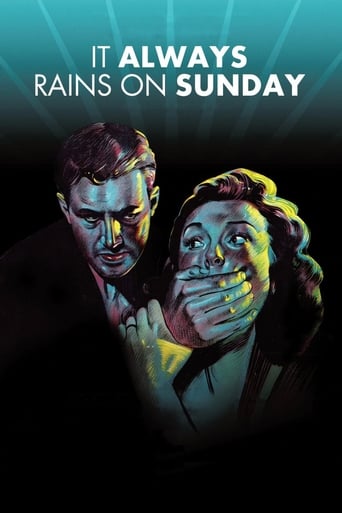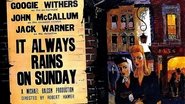Alex da Silva
John McCallum (Tommy) escapes from Dartmoor prison and seeks out his ex-girlfriend Googie Withers (Rose) for food and clothing to help him on his way. Googie is now married to Edward Chapman (George) and lives with his 2 daughters and a son of their own. I think? The son seems a bit old but I think that's the relationship as he refers to Googie as 'mum'. We get involved in their claustrophobic life in their community where everyone seems to know each other. It's the East End of London and everyone is 'salt of the earth'. You get spivs, gangsters, family life and detective Jack Warner (Fothergill) on the trail of McCallum. Googie and McCallum do get together in real life but things are different in this film.The main plot follows the escaped convict storyline but this film is also about family life with characters having their own agendas. Which room is the best room in the house to hide an escaped criminal? You won't believe where Googie directs her ex not only to hideout but also to have a kip! We see McCallum's true feelings towards Googie unravel in the later stages of the film and there is quite an intense final scene as he makes a break for it. I watched the film on a Sunday. And it was raining.
christopher-underwood
A rather splendid 1947 b/w film from the Ealing Studios. I find a lot of these films a little too sentimental and the acting a bit too stagey but this is a real surprise. Great dialogue, convincingly conveyed and together with super cinematography combine to make this a truly enjoyable if nostalgic view. The locations are more Camden than the East End, except for glimpses of Whitechapel at the start but no matter, it all looks good and the views of the railway marshalling yard at the end quite stunning. There is a central story but is is intercut with others and the whole thing bounces along nicely. Even the kids are all right and the amusing bits still amusing. Really though this is a very believable view of London's East End just after the war. Bomb sites, rationing and everyone trying to make the most of what they had. Also there was a feeling that the cops and robbers weren't really that different from each other, just on different sides and the important thing was to survive. Well worth a watch.
Red-125
It Always Rains on Sunday (1947), co-written and directed by Robert Hamer, is a film noir movie set in London's working class East End. The film is dated in many ways--London, two years after the end of WW II, is not the London that we know in the 21st Century. We can still see evidence of bomb damage, rationing still applies, and there's a sense of community where everyone knows everyone else's business. Police and petty criminals engage in banter: Joe runs a lunch wagon where criminals tend to meet. A detective sergeant stops at the wagon for information. Joe: We don't cater to the criminal classes. Detective Sergeant Fothergill: Turned over a new leaf?Several plot lines run through the film. An escaped convict--scarred after being flogged with a cat-o-nine-tails--turns up at the home of a woman he once loved, and who loved him. Rose Sandigate, played by the talented and beautiful Googie Withers, has since entered into a practical marriage with a man 15 years older than she is. We enter into her life, along with the lives of her two step-daughters, her son, three petty criminals trying to get rid of stolen roller skates, and some Jewish good guys, bad guys, and not-so-bad guys.The production values aren't great, and the lower class accents sometimes call for subtitles. Nevertheless, the central plot element of an escaped convict, who returns to find that the woman he loves has married while he was in jail, is as compelling now as it was 60 years ago.Finally, the powerful scene of detectives chasing a man through the train yards in the dark, was surely known to Carol Reed when he directed "The Third Man." Reed's scene, set in the sewers of Vienna, took place miles away from Hamer's London. Even so, in compelling action and suspense, they have a great deal in common.
ukcritic
Dated, soupy, melodramatic at times. Main story, involving the wife who harbours her ex-lover from the police, is curiously underdeveloped and cannot arouse much interest. The other plot threads seem pretty emotionally irrelevant; the film doesn't tie together very well while we're watching it. Nothing stands out as particularly awful; film plods along so-so. Nice little supporting performance by Edward Chapman as the plain and dependable husband.





